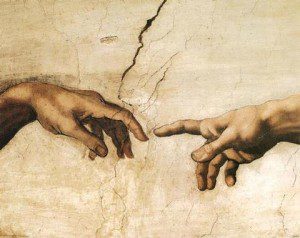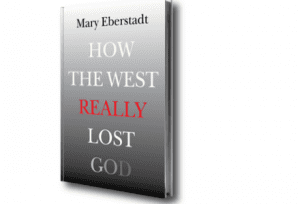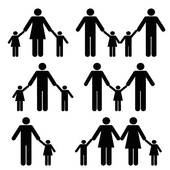 I’m a team player, so when someone on Patheos asked if I would be interested in reading and reviewing a book called How the West Really Lost God (by Mary Eberstadt, Templeton Press, 2013) I signed right up. I like reading about religion, any religion really, and while I didn’t think I’d end up agreeing with all of the book I thought I’d at least get something out of it. There’s some good information in this book, and reading the various theories as to why Christianity is in decline was at least interesting, but I vehemently disagreed with most of Eberstadt’s arguments. It’s a rare day when I literally throw a book down in disgust, but that’s what happened here, and I’ve even reviewed a Sarah Palin
I’m a team player, so when someone on Patheos asked if I would be interested in reading and reviewing a book called How the West Really Lost God (by Mary Eberstadt, Templeton Press, 2013) I signed right up. I like reading about religion, any religion really, and while I didn’t think I’d end up agreeing with all of the book I thought I’d at least get something out of it. There’s some good information in this book, and reading the various theories as to why Christianity is in decline was at least interesting, but I vehemently disagreed with most of Eberstadt’s arguments. It’s a rare day when I literally throw a book down in disgust, but that’s what happened here, and I’ve even reviewed a Sarah Palin cash-grab book for this blog.
To sum up the major thesis of the book, the disintegration of the traditional family is what’s causing the erosion of Christianity in the Western World. Eberstadt comes up with some interesting information to support her argument, but much of it can be dismissed rather easily with a little critical thinking. At one point in the book she points out that college educated one man/one woman families with children are more likely to go to church. I’m sure that they are, since with two college educations they likely have more money than their less educated peers. More money leads to more leisure time, and church can certainly be seen as “leisure time.” When you are forced to work in retail to pay the bills you probably end up working on Sunday. Hard to go to church when you’ve got to greet the people coming into Wal-Mart. (Not a diss on Wal-Mart employees, I know some and they work very hard for far less than money than they are worth.)
Eberstadt calls her thesis on the decline of Christianity in the West the “Family Factor” and she seems quite proud of it. The phrase is parroted throughout out the book like a talking point on the (Bill) O’Reilly Factor. Also random sentences are often italicized as if the words contained within them are making sweeping pronouncements on why Christianity is in decline and also just how smart Mary Eberstadt is for coming up with the phrase the Family Factor. I have no doubt that Mary Eberstadt is smart, but when I can dismiss most of your arguments pretty quickly, well it means you probably aren’t as smart as you think you are.
 I’ll never understand why some people continually seek to link “religiosity” to church attendance. As a former church-goer I can tell you that a great deal of my former (Christian) congregation went for reasons outside of the spiritual. Some of them enjoyed using the gym, many more of them went because it was most likely expected of them. It was the American South, you went to church. Comparing a choice-less Nineteenth Century to 2012 isn’t exactly honest. We are more readily able to identify “religious nones” and “atheists” today than we were fifty or one hundred years ago, but much of that is probably because it’s now socially acceptable to identify that way. I’m rather sure that there have always been atheists and folks who don’t really care about organized religion, but probably felt an obligation to go to church for purposes of socialization or “fitting in.”
I’ll never understand why some people continually seek to link “religiosity” to church attendance. As a former church-goer I can tell you that a great deal of my former (Christian) congregation went for reasons outside of the spiritual. Some of them enjoyed using the gym, many more of them went because it was most likely expected of them. It was the American South, you went to church. Comparing a choice-less Nineteenth Century to 2012 isn’t exactly honest. We are more readily able to identify “religious nones” and “atheists” today than we were fifty or one hundred years ago, but much of that is probably because it’s now socially acceptable to identify that way. I’m rather sure that there have always been atheists and folks who don’t really care about organized religion, but probably felt an obligation to go to church for purposes of socialization or “fitting in.”
Since it’s impossible to survey the human heart, it’s impossible to say that “the West has lost God.” What’s happening today is that people are experiencing God (and gods and spirituality) in completely new and different ways. Perhaps people are no longer flocking to establishment churches, but religion in America is as strong (and as popular) as ever. In a few places Eberstadt pulls the “woe is me, it’s hard to be a Christian in 2013” card. I had a pretty good chuckle reading those passages, mostly because I had The American Bible Challenge* on in the background. If anything Christianity is louder in our culture than it’s been in decades. It shapes our politics, fills our multiplexes, makes up a large part of best-seller lists, and is a major part of websites like this one. If Christianity is being oppressed in the United States I’d hate to see it when it’s free from the closest its been poorly hiding in.
One of the biggest problems with Eberstadt’s book is that it mocks the idea of choice and lacks context for the past. Certainly children of divorce have it tougher than kids raised in a two parent home (and of course Eberstadt doesn’t have a whole lot of room for families with Mom and Mom or Dad and Dad), but divorce shouldn’t be a dirty word. Eberstadt nearly makes it so, laying out a case against divorce that made me angry while reading it. Certainly marriage as an institution shouldn’t be treated lightly, but just because instances of divorce were lower one hundred years ago doesn’t mean those marriages were better than the ones of today. How many women in 1850 were married to abusive spouses? How many people were forced to stay in broken marriages due to lack of choice? My mother was an alcoholic, should my father have stayed married to her while she refused help and drug both him and his children down with her?
 Eberstadt blames some of Christianity’s decline on lower (Western) birth rates. That’s probably true, but what does it say about Christianity? When the only way to make new members of your local congregation is to birth them and then indoctrinate them in the faith, well your faith is pretty weak. If Christianity were the vital and important religion Eberstadt seems to think it should be, it should be able to make its own arguments regardless of how many Christians one breeds. Modern Paganism keeps chugging along and it’s not because all of us are having dozens of kids, it’s because people find it as adults.
Eberstadt blames some of Christianity’s decline on lower (Western) birth rates. That’s probably true, but what does it say about Christianity? When the only way to make new members of your local congregation is to birth them and then indoctrinate them in the faith, well your faith is pretty weak. If Christianity were the vital and important religion Eberstadt seems to think it should be, it should be able to make its own arguments regardless of how many Christians one breeds. Modern Paganism keeps chugging along and it’s not because all of us are having dozens of kids, it’s because people find it as adults.
Christianity is in decline to some degree, but that doesn’t mean “God is dead,” it only means that God is being redefined, reimagined, and experienced in different ways. There’s a spiritual impulse present in all sorts of people (I know atheists who go to “worship” services) and due to greater choice (yay Modern World) people are free to experience the divine how they choose. Families are changing, and lots of people are having less babies, but “the family” has always been in flux. Marriage as an institution has always been an evolving one, and families are not something that should be defined by society, they should be defined by those within them.
*That’s a TV show full of really hard Bible trivia, hosted by former “You might be a redneck if . .” guy Jeff Foxworthy. As I said before, I like religion.

















